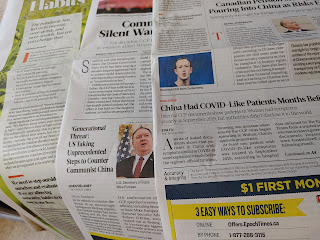Dangerous Headlines
In their determination to sell as many newspapers and magazines as possible, editors seldom think about the repercussion of headlines that misrepresent the story.
The misleading headline might lead to the people the
reporter interviewed, to lose their jobs.
Buildings might go up in flames as religious protesters vent their anger
at the headline. Diplomats might be
recalled. People might die.
Except for blogs where the blogger is the orchestra and the
conductor, traditional newspapers, magazines and television are governed by
division of labour. Reporters gather and write the story. They do not craft headlines. Somebody else does, and somebody higher up,
usually the editor, approves them.
Headlines can be dangerous because some readers don’t even
bother reading the first paragraph. TRUMP
IMPEACHED. That is enough. It is
intentional misrepresentation if the first paragraph does not confirm the
headline’s voltage. It turns out that
the intensity is not confirmed, something might or might not happen. The headline should read TRUMP MIGHT BE
IMPEACHED.
Misleading headlines are exacerbated by the internet because
online versions of traditional newspapers and magazines compete with Twitter,
Facebook, Instagram, a million blogs and Asian social media the West knows
nothing about, because of its language deficiency.
Wrong headlines are on the rise because what was known as
tabloid journalism is now the norm, thanks to the frightening reality that fake
news has more page views than the truth.
By: Nonqaba waka Msimang.




Comments